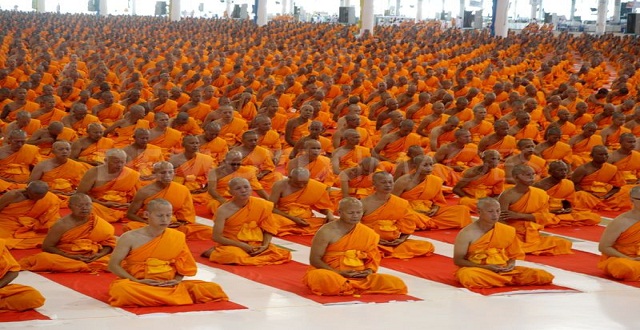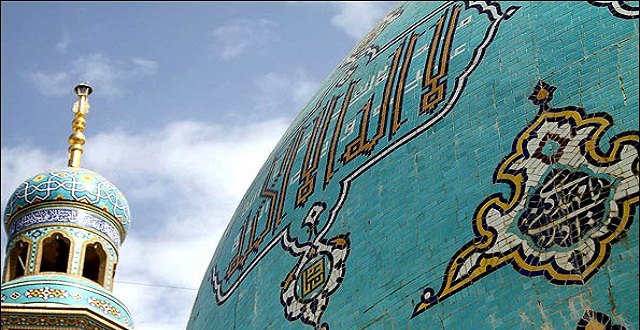
Some believe Buddha to be a divine prophet who had acquired the fundamentals of his religion through revelation. This theory seems to be acceptable for two reasons (although the faith underwent major alteration later):
1- Considering ancient Buddhist teachings: The work history attributes to Buddha is that of a prophet’s. The awakened Buddha, considered the awakening, insight and salvation of the people as his first priority. This salvation was only contingent upon acquiring ethic virtues and knowledge. In ancient Buddhism, there was no staying away from knowledge and using sorcery and magic and enslaving jinns and unordinary mortification. Buddha was against some of the Hindu lifestyles then, and in contrast to the dominant Hindu view at his time, such things didn’t lead to insight and enlightenment in his opinion, but actually did the opposite and backfired on the individual.
His standpoints on matters regarding the existence of God and the hereafter were all religious ones, not philosophical or gnostic. He kept silent regarding the truth and essence of certain matters like the spirit and soul, God, and creation and believed that philosophy wasn’t capable of unveiling the truth about them and that the intellect and rational argument in no way can accomplish what disclosure can. Some of the passages of the holy book of Buddhists leave no doubt for the reader that this religion was indeed a divine one backed by revelation, although it has undergone much alteration.
2- In the story of “Bluher and Yuzasif”, which was narrated as a hadith for the first time in the hadith book of Kamaluddin, Yuzasif is introduced as a divine prophet. There is evidence that Yuzasif is none other than Buddha himself.
What was said till now had to do with ancient Buddhism; as for contemporary Buddhism, it sees Buddha as a god that is worshipped. Buddhism today symbolizes belief in magic and sorcery, reincarnation, stays away from intellect and is full of vagueness and ambiguity. Surya Das, the founder and speaker for Western Buddhism says that Buddhism today is the religiosity of God in which man’s experience is a bridge to finding the truth.[i]
[i] See: Surya Das, Awakening the Buddha Within, translated to farsi by: Maliheh Karbasiyan, pp. 159 and 259.
Detailed Answer
Theory: “The religion the Buddha brought to the people was a divine one”
Reason 1: The teachings of early Buddhism
Reason 2: The story of “Bluher and Yuzasif” and applying to the Buddha.
Reason 1: Teachings of early Buddhism
a) Early Buddhism: Early Buddhism is very clear and in no need of any philosophical understanding and analysis. Profound secrets and philosophical complexities are something later Buddhists have added to this religion.[1] All Buddhism was about in the past was to awaken and enlighten the people and free them from individual and social hardship and give them inner and outer peace.[2]
One of the vital elements of all religions is the simplicity of their concepts so that everyone can understand and grasp them. Without a doubt, a religion can’t be full of vagueness and hard to understand subjects that hardly anyone can comprehend and still be a religion for all people. It is hard to accept that a mystic who believes in existential unity or a mind-centered philosopher to bring a religion for everyone in general, because the terms and concepts employed in such a religion won’t be understandable to all.
This is why divine messengers didn’t use philosophical and gnostic discourse when transmitting their teachings, what they did was speak the same way everyone else would in a way understandable to all.
Of course, this doesn’t mean that divine religions are simple ones lacking depth; depth can be found in all divine religions, what is trying to be said is that speaking complexly and using hard to understand rhetoric has nothing to do with depth and profoundness.
Answering philosophical questions that didn’t have a direct impact on one’s salvation and enlightenment was something early Buddhism would seriously refrain from, and in the few cases in which the Buddha was forced to answer a question of this genre, he wouldn’t imply that it isn’t possible to get into the details of the existence of the soul and how one can reach salvation.[3]
This approach to metaphysical questions is one expected from a divine religion. Our prophet (pbuh) had the same approach when it came to questions like these.[4]
Early Buddhism maintained that man’s main problem has nothing to do with confusing philosophical discussions and has to do with our thoughts and desires and that one needs to dominate these desires in order to be enlightened and freed from pain and suffering.[5]
This approach is evident in Islamic teachings as well; for instance it is said that one needs to purify himself of everything other than Allah (swt) and that wisdom must flow from his heart to his tongue.[6]
To make it short, the following points related to early Buddhism can be considered proof that this religion was a divine one in the past:
1- The spiritual and metaphysical origin of Buddhism[7]
2- Passages in their holy book that show Buddhists were true monotheists[8]
3- The spiritual journey of the Buddha from the material world to the domain of oneness and back to guide the people[9]
4- Belief in the fact that it is impossible to know god[10]
5- Belief in the transiency of this world[11]
6- Belief in an immaterial element residing in man (the soul)[12]
7- Belief in the fact that man doesn’t perish through death[13] and that after death, the soul is reborn (goes through different stages; not reincarnation)[14]
8- Belief in that when the body dies, the soul continues its life in another ‘imaginal’ (mithali) body[15]
b) Doctrines of early Buddhism
1- God in Buddhism: Buddha would never speak of the essence of God because to him, it was impossible to completely understand Him.[16] Speaking of Allah’s (swt) essence and trying to comprehensively understand Him is something that our imams (as) have also prohibited in hadiths.[17] Contemporary Buddhism pursues disclosure of the creator of the universe, not to prove him through ration and reasoning.[18]
This teaching has roots in early Buddhism. The Buddha considered reasoning and logic to be incapable of being applied to metaphysics and the world above. We believe that the mind can enter these realms, but the only conclusion it will reach in the form of philosophy and introspective mysticism is that “I know that regarding the immaterial world, I know nothing”. Indeed! The only way to learn of the immaterial world is to be immaterial and have no attachments to this world, and this is something shared by Islam, the final accepted religion by Allah (swt) and early Buddhism.
This is a passage from the Buddhists’ holy book:
“I am Brahma. I am a great and exalted god. I am not begotten nor created. I created the world. I am the lord of the world. I can create, cause change and grant life, I am the father and master of everything.”[19] These phrases remind us of the verses of surah Tawhid.
According to phrases of Nirvana, “the one who does what He wishes” (God) is eternal, stable, non-temporal (qadim), without time, never dying, not begotten, goodness itself, one, and the only virtue and perfection that cannot be reached in our lives.[20]
Considering that the Buddha, contrary to what is believed and practiced today, never introduced himself as a god and unlimited being and also didn’t believe in a personified destiny-determining god[21], and at the same time saw all phenomena in this world as temporal and transient and changing and unstable[22], it can be concluded that all of the virtues and attributes mentioned for the gods above are ones that apply to a unified and one god; a god that can in no way be comprehended and is limited in no way to any material thing or place.
2- The world from Buddhism’s perspective
Buddhism looks at the world in a way that will only entail guidance and righteousness. From its perspective, the world is temporal and always changing, pursuing it brings suffering and deprives of peace of mind; such a thing isn’t worth getting attached too![23]
Imam Sadiq (as) portrays the temporality of this world in such: “…و ان کانت الدنیا فانیة فالطمأنینة الیها لماذا؟” (If the world is temporal, then why do you get attached to it?!)[24] Imam Hasan (as) portrays it like this: “…ان الدنیا دار بلاء و فتنة و کل ما فیها الی زوال” (This world is a place of hardship and examination, everything in it is doomed to perish and end.)[25]
3- Man in Buddhism
Early Buddhism insists on a spiritual and immaterial dimension to man. He doesn’t cease to exist through the death of the body, but continues to live in a new spiritual or ‘imaginal’ (mithali) body.[26]
The Buddha believes in the spiritual teacher (the complete individual; prophet) and that he must be followed, but at the same time believes that one must take the path to perfection himself.[27] When a person, with the guidance of his teacher, takes the path and suppresses his desires and lusts, he reaches enlightenment and becomes a radiant torch, giving off light [of guidance].[28]
Belief in an immaterial element in man and its life after the death of the body and also, belief in a complete individual being one’s teacher, in addition to one taking the path for his or herself are all fundamental beliefs of Islam.
Keeping in mind all of these early Buddhist teachings, it can strongly be theorized that contemporary Buddhism has roots in revelation.
Nevertheless, contemporary Buddhism has swayed from its original form and contrasts it dramatically because:
1- It believes in reincarnation[29]
2- It believes in Buddha being a god and worshipping him.[30]
3- It refrains from intellect and ration and believes in magic and sorcery and capturing jinns and shooing devils, while the Buddha would prohibit his followers from engaging in these matters.[31]
4- Belief in reciting sutras that have remained since the times of the demons and devils and gods and other fictional characters in which according to urban legend, had been created during the time of unawareness in order to obtain knowledge and understanding. The Buddha denies all matters like these that have found way into contemporary Buddhism and insists that man must strive to take the path to perfection.
5- Complex and ambiguous concepts are a common thing in today’s Buddhism, while in early Buddhism, there was no such thing and it was a clear religion; its clarity being like the sun and moon.[32]
Reason 2: The story of “Bluher and Yuzasif” and its application to the Buddha
This story was first narrated in Kamaluddin[33] and after that in Biharul-Anwar[34] and Aynul-Hayat[35]. Allamah Majlisi calls this story a unique one regarding cutting off from the love of this world and knowing its deficiencies. He says that knowing these stories make one needless of knowing philosophical themes that waste one’s life and sometimes lead to not reaching salvation and peace of mind.[36] In this story, Yuzasif is a divine prophet.[37]
There is evidence that the Yuzasif in this Islamic hadith is the Buddha himself. We will discuss two of these evidences: 1- Lingual 2- Transcriptive
Specific Persian names are written in a different way in Arabic. In all cases, the letter ‘پ’ in Farsi, is written as a ‘ف’ or ‘ب’; for instance, the word ‘پارسی’ is written as ‘فارسی’, or the word ‘پهلوی’ is written as ‘فهلوی’ and the word ‘پردس’ is written as ‘فردوس’. Also, the letter ‘د’, which in old times had a pronunciation similar to the letter ‘ز’, was written as the letter ‘ذ’ or ‘ز’. For example, the word ‘یوداسف’ was written as ‘یوزاسف’, or ‘بزرکمهر’ was written as ‘بوذرجمهر’. What is trying to be said is that specific names have always been subject to change in pronunciation and transcription throughout history. Another example is the term ‘بودای شاکمونس’ which is written as ‘بورکمال چاکیامونس’ in philosophy.
The second proof is the harmony between the life of the Buddha and the narrative of Yuzasif.[38] The following are examples of some of the similarities between the two:
1- The birthplace of the two was India and both were of high classes of society.[39]
2- The prophecies of astronomers regarding his prophethood and monasticism.[40]
3- Stressing on the fact that this world is a transient one.
This second proof finishes the job and makes it clear what the answer to the question this article is addressing is.
Once again, we stress that what these reasons prove, is that early Buddhism was a divine religion. As was repeatedly noted, as with other religions such as Christianity and Zoroastrianism, Buddhism underwent much change, totally contradicting its original form and suffering from distortion.
——————————————————-
[1] Jalaluddin Ashtiyani, Erfane Buddhism, pg. 77.
[2] Ibid, 364.
[3] Erfane Buddhism va Jaynism, pg. 226. See: Manuchehr Khodayar Muhebbi, Eslamishenasiye Dine Tatbiqi, pg. 160; see: Ahmad Aram, Tarikhe Tamaddon, vol. 1, pg. 497.
[4] Isra’:85.
[5] John B. Nas, Tarikhe Jame’e Adyan, Ali Asghar Hekmat, pg. 188.
[6] See: Wasa’ilul-Shia, vol. 11, pp. 122-124; Muhammadi Rey Shahri, Mizanul-Hikmah, vol. 2, pg. 66.
[7] Amir Husein Ranjbar, Dar Justejuye Rishehaye Asemani, vol. 1, pg. 42.
[8] Ibid, pg. 155.
[9] See: Tarikhe Jame’e Adyan, pg. 184; Seyyed Hasan Amin, Baztabe Usturehaye Buddha dar Iran va Eslam, pg. 24.
[10] Seyyid Abu Taleb Fana’i, Mahmoud Ebrahimian, DinShenasiye Tatbiqi, vol. 1, pg. 57.
[11] Ibid, pg. 58.
[12] Ibid, pg. 60.
[13] Ibid.
[14] See: Muhammad Baqir Mu’meni and Muhammad Sadiq Hamedani, Tarikhe Jahane Bastan, vol. 1, pg. 381.
[15] Seyyid Abu Taleb Fanai and Mahmoud Ebrahimian, Din Shenasiye Tatbiqi, vol. 1, pg. 60.
[16] Ibid, pg. 57.
[17] See: Sheikh Saduq, Seyyid Hashem Hoseini Tehrani, Al-Tawhid, pp. 454-458.
[18] Dar Jostejuye Rishehaye Aseman, pg. 154.
[19] Ibid, 155.
[20] Ibid.
[21] Erfan, Buddhism vaJaynism, pg. 296.
[22] Baztabe Usture’iye Buddha dar Iran va Islam, pg. 36; Dar Jostojuye Rishehaye Aseman, pg. 155; Din Shenasiye Tatbiqi, pp. 54, 58 and 60. This world has been looked at as transient and temporal in Islamic hadiths, see: Al-Tawhid, pp. 376-378.
[23] Seyyid AbuTaleb Fanai and Mahmoud Ebrahimian, Din Shenasiye Tatbiqi, pp. 58-60; Erfan, Buddhism va Jaynism, pg. 235.
[24] Al-Tawhid, pp. 376-378.
[25] Ibid.
[26] See: Seyyid Abu Taleb Fanai and Mahmoud Ebrahimian, Din henasiye Tatbiqi, pp. 60-62.
[27] Erfan, Buddhism va Jaynism, pg. 296.
[28] See: Tarikhe Jame’e Adyan, pp. 188-191.
[29] See: Ali Asghar Hekmat, Noh Goftar dar Tarikhe Adyan, pg. 77; Tarikhe Jahane Bastan, pg. 381; Tarikhe Jame’e Adyan, pp. 188-191; Ali Akbar Kasmai, Khoda Bavari dar Din va Falsafeh
[30] Din Shenasiye Tatbiqi, pp. 57-58; see: Abdullah Muballeghi Abadi, Tarikhe Adyan va Mazahebe Jahan, vol. 1; Dar Jostojuye Rishehaye Aseman, pg. 42.
[31] Erfan, Buddhism va Jaynism, pg. 299.
[32] Ibid, pg. 77.
[33] Sheikh Saduq, Kamaluddin wa Tamamul-Ni’mah, Ali Akbar Ghaffari, pg. 577-638.
[34] Allamah Majlisi, Biharul-Anwar, vol. 75, pp. 383-485.
[35] Allamah Majlisi, Einul-Hayat, pp. 315-386.
[36] Ibid, pg. 386.
[37] Ibid, pp. 381 and 384.
[38] Baztabe Usture’iye Buddha dar Iran va Islam, pp. 44-81.
[39] See: Einul-Hayat, pg. 322; Hashem Raziyy, Adyane Bozorge Jahan, pg. 178.
[40] Einul-Hayat, pg. 322; Adyane Bozorge Jahan, pg. 188.










